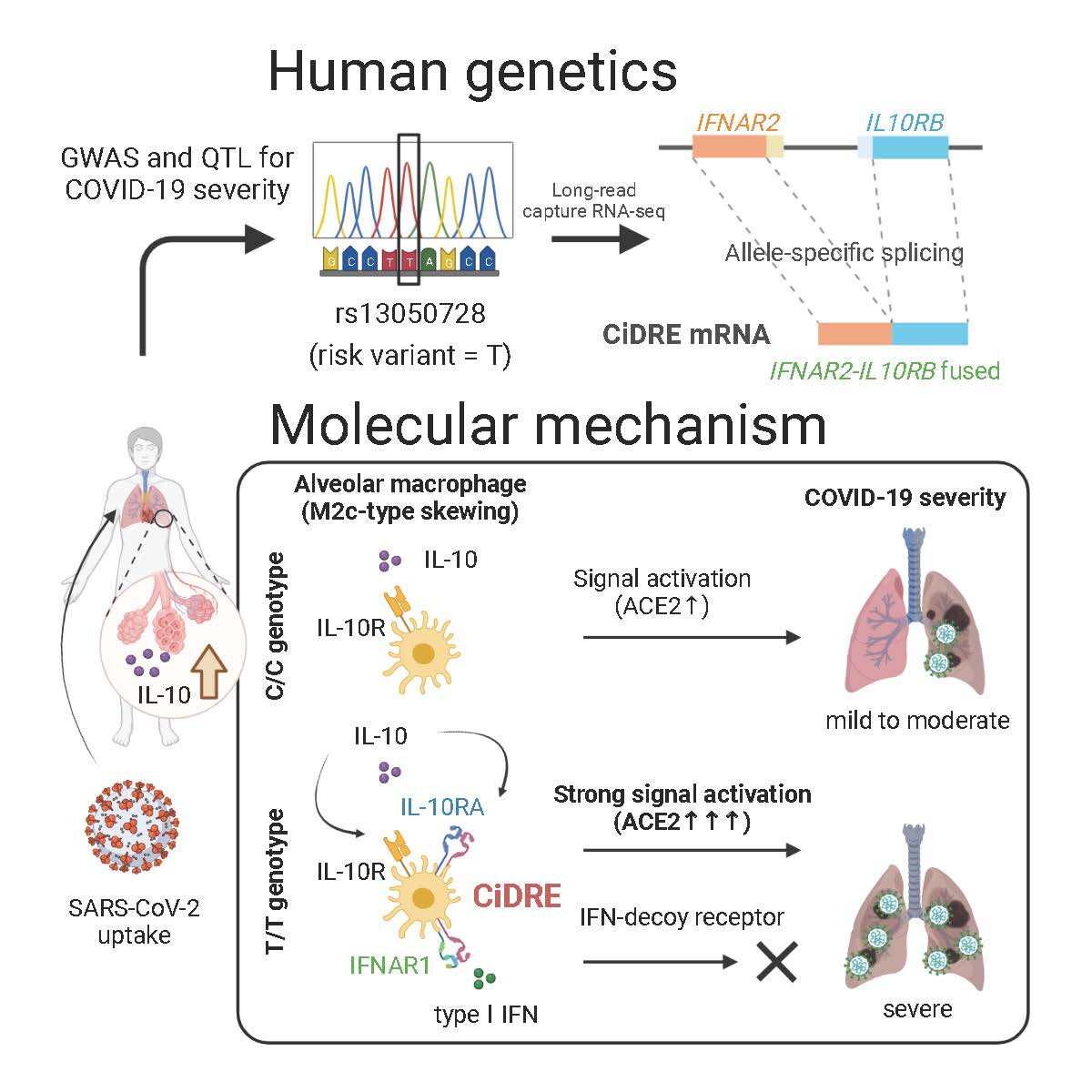CiDRE renders alveolar macrophages susceptible to SARS-CoV-2 invasion
Researchers from Tokyo Medical and Dental University (TMDU) find that alveolar macrophages expressing the readthrough transcript CiDRE are stimulated by interleukin-10 to express ACE2, the SARS-CoV-2 receptor, and promote cytokine storm in patients with COVID-19
Tokyo, Japan – Despite intensive research since the pandemic began, much remains unknown about COVID-19, particularly why it can be so severe in some cases and relatively mild in others. Now, researchers from Japan have identified a genetic quirk that could make some patients more likely to experience severer forms of COVID-19.
In a study published this month in Immunity, researchers from Tokyo Medical and Dental University (TMDU) have revealed that expression of a fusion transcript by a specific immune cell subtype makes patients more likely to experience severe COVID-19 symptoms.
Cytokine storm is an intense immune reaction that can occur during COVID-19 infection, with serious consequences for the patient. This immune reaction occurs when severe acute respiratory syndrome coronavirus 2 (SARS-CoV-2) binds to the angiotensin-I-converting enzyme 2 (ACE2) receptor, which is expressed by a variety of cell types, although it remains unclear which cells are responsible for cytokine storm.
“Alveolar macrophages, which are immune cells that reside in the lungs, have been considered not to be susceptible to infection by SARS-CoV-2 because of their low ACE2 expression,” says lead author of the study Yuichi Mitsui. “However, recent studies have suggested that these cells may indeed be invaded by SARS-CoV-2 and participate in promoting cytokine storm.”
To determine whether alveolar macrophages do in fact play a role in severe COVID-19, the researchers analyzed gene expression in hamsters infected with SARS-CoV-2 compared with uninfected hamsters. They then looked at data from human patients to see what their observations in hamsters meant clinically.
“The results were very clear,” explains Takashi Satoh, senior author. “The anti-inflammatory factor interleukin-10 (IL-10) was highly upregulated in the infected animals. Importantly, IL-10 induced normal alveolar macrophages to express ACE2, making them susceptible to invasion by SARS-CoV-2.”
Analysis of patients’ samples showed that the genetic polymorphism of IFNAR2 gene, which is located near IL10RB, a subunit of the IL-10 receptor gene that amplifies IL-10 signals, was significantly associated with COVID-19 severity. The researchers found that in individuals with the genetic risk of COVID-19 severity, a readthrough transcript that essentially fuses the two genes together produces a fused protein that they named “COVID-19 infectivity enhancing dual receptor” (CiDRE). Alveolar macrophages expressing CiDRE exhibited high levels of the gene encoding ACE2 and substantial SARS-CoV-2 invasion in the presence of IL-10.
This study showed that high IL-10 and CiDRE expression are potential risk factors for severe COVID-19. It seems likely that treatment with IL-10R and CiDRE inhibitors could help prevent cytokine storm in patients with COVID-19. Additionally, this first report of a genotype-based functional readthrough transcript in immune cells suggests that other readthrough transcripts may play a functional role in immune cells.

Graphical overview of COVID-19 severity mechanism via alveolar macrophage
Individuals with the T allele at rs13050728 in the IFNAR2/IL10RB locus, which is strongly associated with COVID-19 severity, have high expression of the “hybrid” receptor CiDRE. In addition, in human alveolar macrophages with the T/T genotype, CiDRE enhances IL-10 signaling and attenuates type I IFN signaling as a decoy receptor, promoting severe COVID-19.
Summary
Journal Article
TITLE:Expression of the readthrough transcript CiDRE in alveolar macrophages boosts SARS-CoV-2 susceptibility and promotes COVID-19 severity
DOI:https://doi.org/10.1016/j.immuni.2023.06.013
Correspondence to
Takashi Satoh, Professor
Department of Immunology,
Graduate School of Medical and Dental Sciences,
Tokyo Medical and Dental University (TMDU)
E-mail:secretary.mbch(at)tmd.ac.jp
*Please change (at) in e-mail addresses to @ on sending your e-mail to contact personnels.

